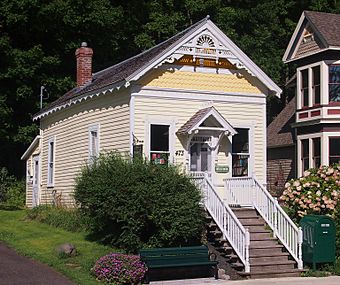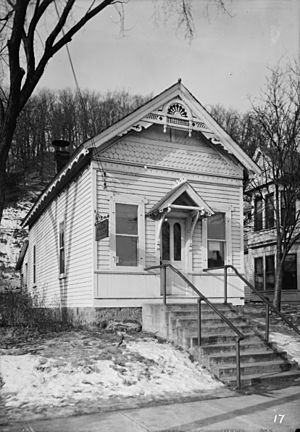Taylors Falls Public Library facts for kids
Quick facts for kids |
|
|
Taylors Falls Public Library
|
|

Taylors Falls Public Library from the south-southeast
|
|
| Location | 473 Bench Street, Taylors Falls, Minnesota |
|---|---|
| Area | .25 acres (0.10 ha) |
| Built | 1854, remodeled 1887 |
| Built by | John Jacob Spengler, remodeled by Thomas Peck |
| Architectural style | Carpenter Gothic/Stick style |
| NRHP reference No. | 70000290 |
| Added to NRHP | October 15, 1970 |
The Taylors Falls Public Library is a special place in Taylors Falls, Minnesota. It's a public library that still uses its original building from the 1800s!
This building started as a tailor shop in 1854. Later, in 1887, it was changed into a library. The Taylors Falls Public Library is important because of its unique look and its history in education. It shows what small-town libraries were like a long time ago.
Contents
What Does the Library Look Like?
The Taylors Falls Public Library is a one-story building. It has two rooms and is about 32 feet (9.8 m) long and 14 feet (4.3 m) wide. It's made of wood with special siding called clapboard. The building sits on a sandstone foundation.
Cool Architectural Details
The front door has a cool, pointed arch design called a Gothic Revival canopy. On each side of the door, you'll see Stick style windows. These windows have fancy decorations from the Eastlake Movement.
Look closely at the roof edges and the front of the building. You'll see beautiful, carved wooden decorations. A smaller room, like a lean-to, was added to the back later. It measures about 14-by-7-foot (4.3 by 2.1 m).
Inside the Library
When you step inside, the front room has a special ceiling. It's shaped like a half-circle, called a barrel-vault ceiling. The back room has a different kind of ceiling made of pressed metal, called a tin ceiling.
A Look Back: The Library's History
The building was first built in 1854 by a man named John Jacob Spengler. It was his tailor shop. He worked in the front room and lived with his family in the back. During the American Civil War, Mr. Spengler even sewed uniforms for the Union soldiers!
From Tailor Shop to Library
In 1887, the building was sold to the Taylors Falls Library Association. They wanted to use it as a library. Thomas Peck helped change the building for its new use. He added the fancy decorations you can still see today. The lean-to room at the back was added sometime after that.
The library is still open today in this historic building. It has a collection of about 10,000 items for people to read and learn from.
 | Victor J. Glover |
 | Yvonne Cagle |
 | Jeanette Epps |
 | Bernard A. Harris Jr. |




